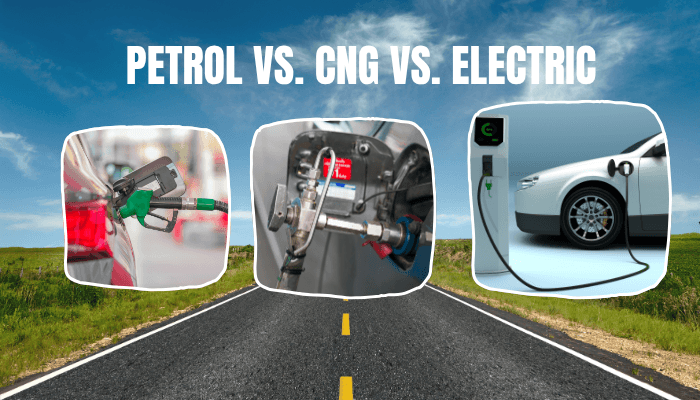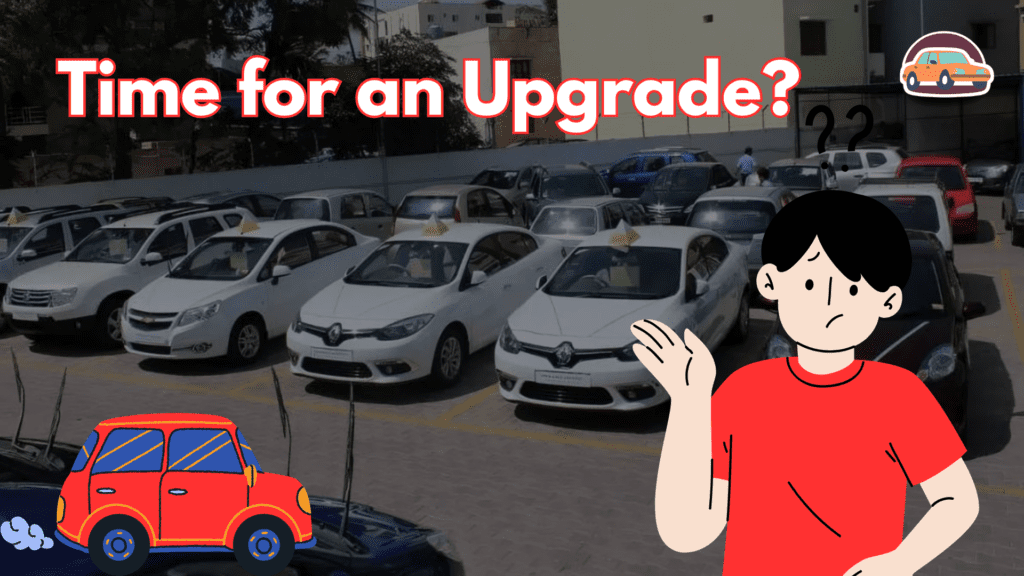If you’re planning to buy a car and want to keep it for several years, choosing the right fuel type is very important. Whether you’re looking for low running costs, smooth performance, or future-ready technology, your choice between petrol cars, CNG cars, and electric vehicles (EVs) will affect your savings and experience.

In this blog, we’ll explore which option is best for long-term ownership, especially with rising fuel prices, growing EV adoption, and the recent diesel car ban in Delhi.

1. Initial Cost
• Petrol cars are the most budget-friendly when it comes to buying. Hatchbacks like Alto or WagonR start at around ₹5–6 lakhs.
• CNG cars cost about ₹1 lakh more than their petrol versions due to the extra equipment. However, they’re still cheaper than EVs.
• EV cars in India, like the Tata Tiago EV or MG Comet, start from ₹8.5 lakhs. EV car prices in India are coming down slowly, but still remain high for most middle-class buyers.
Quick tip: If you’re on a budget, CNG cars are ideal. If you’re looking for long-term savings, an EV car under 15 lakh might be worth the investment.
2. Running Cost
• Petrol is the costliest to run. With prices around ₹100 per litre, the petrol for a car costs crosses ₹45,000–₹50,000 annually if you drive regularly.
• CNG cars offer major fuel savings. With prices around ₹75/kg, the running cost is much lower than petrol.
• Electric cars are the most affordable in the long run. EV car charging cost is around ₹1.2–₹1.5/km at home, much lower than petrol or diesel cars.
You can even search for an EV car charging station near me, as infrastructure is improving in cities.
3. Maintenance Costs
Petrol cars need regular servicing, engine oil, filters, and clutch work.
• CNG cars require slightly more care, including checking the CNG kit and spark plugs.
• EV cars in India need the least maintenance since there’s no engine oil or gear system. Most EVs come with a 5–8 year battery warranty, reducing risk for long-term owners.
4. Mileage & Efficiency
• Petrol cars with best mileage in India offer around 20–22 km/l under ideal conditions.
• CNG cars can give 28–32 km/kg, making them a great option for daily commuters.
• EV cars under 10 lakhs like the Tiago EV deliver 250–300 km per charge, depending on usage. These cars are highly efficient and low-cost in city traffic.
Best choice for city use: EV cars or CNG models offer better mileage and lower daily fuel expense.
5. Comfort & Drive Quality
• Petrol cars offer smooth power and quiet drive quality.
• CNG cars feel a little slower in pickup, especially with AC on. Also, the CNG cylinder takes up boot space.
• EV cars deliver instant torque, quiet cabins, and smoother acceleration. With no gear shifts, driving is stress-free, especially in traffic.
6. Environmental Impact
• Diesel cars in India have higher emissions, and that’s why there’s growing action against them. The diesel car ban in Delhi is already active for 10-year-old vehicles.
• Petrol cars are cleaner than diesel cars but still emit pollutants.
• CNG is better than petrol and diesel—it burns clean and reduces engine wear.
• EVs have zero tailpipe emissions and are the most eco-friendly. As the electricity grid shifts to renewables, their carbon footprint gets even lower.
With increasing bans like the diesel car ban in India policy across cities, switching to EV or CNG is a safer long-term move.
7. Resale Value & Future-Readiness
• Petrol cars may lose resale value over the next 5–10 years as cleaner fuel types gain importance.
• CNG cars have stable resale value in metro cities where CNG pumps are available.
• Electric vehicles are becoming more popular. As more people shift to EVs, resale value is expected to improve.
Also, with the diesel car ban in Delhi latest news today, diesel resale has already taken a hit. If you’re considering buying a diesel car second hand, check the registration year and age rules carefully.
8. Fuel Availability & Convenience
• Petrol stations are available almost everywhere. You won’t face range issues.
• CNG stations are limited to certain areas. You may face long queues in peak hours.
• EV charging infrastructure is growing, especially in metro cities and highways. Still, it’s not yet as widespread as petrol pumps. But if you have home parking, charging becomes very easy.
Final Conclusion
Here’s a quick summary to help you choose:
| Fuel Type | Best For |
|---|---|
| Electric | Low maintenance, low running cost, future-ready, eco-friendly |
| CNG | Great fuel savings, good for daily city driving |
| Petrol | Best for budget buyers needing flexibility, but not future-proof |
| Diesel | Avoid unless you need power or heavy use—especially after the diesel car ban rules |
If you want a car for 5 or more years, EV cars in India are becoming a smart long-term option. CNG cars are still the most economical if you drive regularly and have access to fuel stations. Petrol cars are okay for low usage but may lose value as clean mobility grows. Diesel cars, especially in Delhi, are now a risky choice due to strict rules and bans.
Want more smart car insights like this?
Follow My Car Wisdom for practical car tips, buying guides, and auto industry updates you can trust.
Raja Yadav, the content writer at My Car Wisdom, brings a unique voice and style to our blog. With a knack for storytelling and a keen eye for detail, Raja ensures that every piece of content is informative, engaging, and easy to understand. His focus is on delivering high-quality articles that cater to both novice car owners and seasoned automotive enthusiasts.




